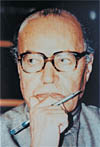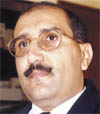Dr. Al-Murtadhah Al-Mohatwari: “The President can crown his great unification achievement by controlling corrupt officials.” [Archives:1998/24/Interview]
Dr. Al-Murtadha Bin Zayd Al-Mohatwari is a renowned, and sometimes controversial, reformist of the Zaydi sect in Yemen. Coming from a family of religious and language scholars, Al-Mohatwari, 43, went on to study jurisprudence and Arabic in Sanaa. He later received a masters and a Ph.D. degree with distinction from Cairo University – the Ph.D. being in the subject of slander and defamation in Islam.
In addition to the religious school and research and studies center (Al-Badr Scholastic and Cultural Center) he owns and runs in Sanaa, Dr. Al-Mohatwari is also a lecturer in the Sharia and Law College at Sanaa University.
Al-Mohatwari’s opinions and calls for reform are regarded by many as unorthodox and quite controversial, bringing upon him the wrath of both the establishment and other rival Islamic groups.
Mohammed Bin Sallam of Yemen Times talked to Dr. Al-Mohatwari at Al-Badr Center and filed the following interview. Excerpts:
Q: Could you tell a bit about Al-Badr Center?
A: Most people nowadays go to school or university not for gaining knowledge, but merely to get a degree and be employed, if possible. Public employment has suppressed genius. Islam encourages and urges his follower to seek knowledge wherever they can.
I founded Al-Badr Center and opened its doors to all students who wish to study and reside in it. My ambition is to establish an institution capable of creating great scholars and interpreters of Islamic Sharia, who are able to move on with the times. I try not to overlook the rapid scientific and social developments in our society and the world at large.
Al-Badr Center, established 10 years ago, includes a computer center, a library, a small farm and a mosque with a capacity of 15,000 people. The center also has a special interest in women issues.
I want people to understand that Islamic studies are not pure theology, but a live science.
Q: How many students are there?
A: There are 150 students in the boarding section and 250 day students studying at primary and preparatory education levels and at the first and second grades of the secondary-school level. The third grade of secondary school and even university levels will opened in the near future.
Q: How is the center financed?
A: Myself and other philanthropists paid the initial expenses and still fund the center. Many of the students with professions and vocations contribute a lot to the upkeep of the center. I’d like to seize this opportunity to emphasize the fact we do not receive any assistance from any foreign sources, as some people would like to insinuate.
The state “helps” from time to time by sending troops to bomb the place. Last time the President did not know about it until after the incident. All we want is to be left in peace to conduct our research and studies.
Q: Who was then behind the problems and attacks to which you were subjected?
A: I am very sorry to say that they were elements belonging to the Islah party. If the party does not really condone their acts, why are they still within its ranks? Almost every problem we face is caused by Islahi people, who appear hidden behind many disguises, but we know them all. I call them to have face-to-face, civilized discussions in order to be able to find out who is the errant.
Q: Why would the Islah party cause you all this trouble?
A: I really do not know what their problem is. I asked permission from the President himself to establish this center, which I did through sheer personal efforts. I sometimes complain to Sheikh Abdullah Bin Hussain Al-Ahmer, who has all the noble characteristics of a Yemeni man. He is very responsive.
I really do not want to be involved in inter-sectarian violence and strife. I am just a mosque speaker, a philanthropist and have a study and research center. If they have any objections on any religious grounds, then we can discuss it. Why resort to violence?
Q: Which Islamic sect do you primarily follow in your teachings?
A: I very much admire the Zaydi sect for it encompasses the best of other sects. We actually study and teach the Sharia interpretations of Imam Al-Shafi’i more than we do the teaching of Imam Zayd – the founder of the Zaydi sect.
Followers of the Zaydi sect respect the opinions and faith of others, and tend to be eclectic. They adopt the teachings of other imams if enough evidence points to their suitability. Zaydism exhort people to stand up to oppression and say the truth, irrespective of the consequences.
Zaydism is a revolutionary creed, a fact which gets into trouble with oppressive regimes and tyrants. It is always in the opposition. In the end, we are all human beings, whether Muslim or Christians, striving for the good of humanity.
Q: Can we call you a reformist of the Zaydi sect?
A: Zaydism has been misunderstood throughout the ages, and its heritage is often destroyed or lost. I want this creed to gain its due status and recognition. Some people, unfortunately, think that the Zaydi sect is a relic of the overthrown regime of the Imam, which is not true. There are numerous good teachings in Zaydism, worthy to be adopted by Muslims from other creeds.
Q: What is the relation between Zaydism and other Shiite sects?
A: Shiite in Arabic means a group with a certain loyalty. It was used to describe the people who declared their allegiance to Imam Ali [Mohammed’s son-in-law and 7th century martyr] in his conflict with Moawia – the contender to the Khalifate.
Some Shiite ideas are extremist, which must be rejected. But the Shiite Muslims in Iran and other countries, for example, represent an added credit to the Islamic nation.
Q: What reference books do you rely on in your studies and reformist efforts?
A: We have books written by prominent Zaydi Imams and other scholarly members of the Prophet’s family. A lot of the Zaydi books, however, were suppressed or even destroyed by the Ummayid and Abbassyd rulers.
Zaydism is really a Sunni sect. One look at the books in my library would strongly point to this fact. I am ready to challenge any Muslim scholar to find a digression from true Islam in Zaydi books or teachings.
Q: What do you say to the controversial books written by Imam Al-Shawkani?
A: Al-Shawkani is a source of pride for the followers of Zaydism. Some historians say that he exploited Zaydism, which relies on constant renewal and up-to-date interpretations of Islamic Sharia. Some scholars tried to use the criticisms made by Imam Al-Shawkani of some beliefs in the sect to denigrate Zaydism.
Any way, there are other more important Zaydi scholars and interpreters of Sharia such as Qadhi Hussain Al-Syyaghi. I am sorry to say that some of Al-Shwakani’s books are standard textbooks at Al-Azhar University just because they criticize the Zaydi beliefs.
Q: What problems do you face in your work?
A: The most major problem is aggression by others. I am regarded as an enemy by most of the Islah members. Why? I do not know.
Other difficulties are of a financial nature. Some students come from the countryside without any resources, whatsoever. I feel very sad when I cannot help them.
Q: What are your future plans?
A: Our primary plan is to collect, re-organize and re-publish the Zaydi heritage so that it becomes a standard university curriculum, especially in Al-Azhar of Egypt. This precious heritage should not remain within the confines of long-forgotten books and libraries. The manuscripts we have are threatened with disintegration and being lost forever. We have put all our resources to restoring and re-publishing these manuscripts.
I hope that Al-Bad Center be recognized and accredited by the state. I also plan to expand the center and open new departments for manuscript restoration.
Opening a private university and a mother and child health center is also on our agenda.
Q: How do you evaluate the current political situation in Yemen?
A: Yemeni officials seem to be more concerned with external than internal issues. They are trying to polish the country’s image by hosting regional and international forums and gatherings; while, internal conditions are deteriorating. Who is responsible for all this?
The President is a 100% responsible. He is the first person responsible for this country, in front of God and the people. He has borne and is still bearing the trust. We ask God to help him in his task.
Q: What are the possible solutions for the deteriorating circumstances?
A: The solution is to start by correcting ourselves. The President’s name will forever be linked to the glorious unification of Yemen. Why not crown this great achievement by returning the money stolen by corrupt officials to the people? He will find all the Yemeni people ready to sacrifice for this noble goal. The President is the only person capable of putting a decisive end to the deteriorating situation.
Q: Do you feel optimistic?
A: I know that the President is a courageous man, who does what he says.
Q: Any last word?
A: I hope not to be alone in my endeavor and really wish others would join me to make the world a better place.
——
[archive-e:24-v:1998-y:1998-d:1998-06-15-p:./1998/iss24/intrview.htm]


